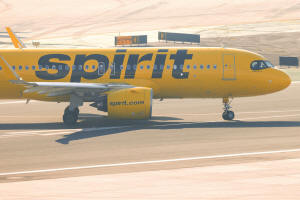|
JetBlue shares, which closed 5% higher on Tuesday, were also
down 1.3% before the bell, in line with other airline stocks.
"We believe this is a positive for JetBlue as business at Spirit
turned negative between the time the merger was announced to
now," TD Cowen analyst Helane Becker wrote in a note.
The best-case scenario for Spirit would be a Chapter 11 filing,
followed by a liquidation (Chapter 7), Becker added.
Spirit has faced difficulties in achieving profitability due to
a surge in operating expenses and ongoing supply chain problems,
which has raised concerns about the company's ability to repay
its remaining debt that is due to mature next year.
Each airline now seems to face crucial strategic and financial
decisions, Citi analyst Stephen Trent wrote in a note while
maintaining "neutral" ratings on both stocks.
A deal with JetBlue would have created the fifth-largest carrier
in the U.S. and would have been a shot in the arm for Spirit.
"We see little valuation support for Spirit in the absence of a
merger," J.P.Morgan equity analyst Jamie Baker said.
Spirit's ratio of enterprise value to sales for the next 12
months is 1.3, compared to 0.6 for suitor JetBlue, as per LSEG
data. A low ratio implies a more attractive investment
opportunity.
The airlines can appeal the ruling. In a joint statement,
JetBlue and Spirit said they were evaluating "next steps as part
of the legal process".
(Reporting by Shivansh Tiwary in Bengaluru; Editing by Krishna
Chandra Eluri)
[© 2024 Thomson Reuters. All rights
reserved.]
This material may not be published,
broadcast, rewritten or redistributed.
Thompson Reuters is solely responsible for this content.

|
|




